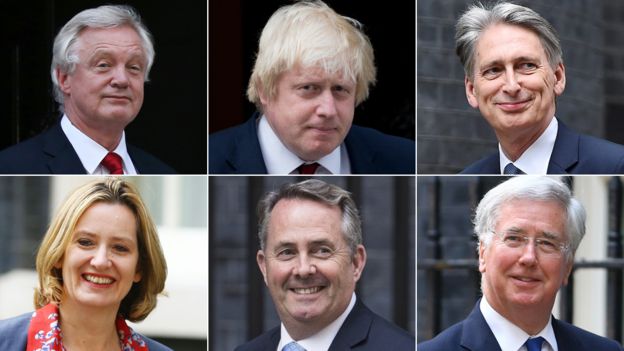
Prime Minister Theresa May will continue to form her new government later – as she begins her first full day in Downing Street. Leading Brexit campaigner Boris Johnson said he was “humbled” having been named new foreign secretary, in one of Mrs May’s first cabinet appointments. Philip Hammond became chancellor, Amber Rudd is home secretary, and Eurosceptic David Davis is new Brexit secretary. Mrs May later told European leaders she was committed to the UK leaving the EU. Asked about his first priorities as chancellor, Mr Hammond said there would be “no emergency Budget”. He said he would work closely with the Bank of England and other economic experts and make “carefully considered decisions over the summer”, followed by an Autumn Statement “in the normal way”. Before the EU referendum, his predecessor George Osborne said he would have to cut public spending and increase taxes in an emergency Budget if the UK voted for Brexit. In a series of congratulatory phone calls taken by Mrs May on Wednesday evening, the UK’s second female prime minister spoke to German Chancellor Angela Merkel, French President Francois Hollande and Irish Taoiseach Enda Kenny. A Downing Street spokesman said Mrs May had “emphasised her commitment to delivering the will of the British people to leave the European Union”. “The prime minister explained that we would need some time to prepare for these negotiations and spoke of her hope that these could be conducted in a constructive and positive spirit,” the spokesman added. Mrs May will continue to fill out her new cabinet later on Thursday, with the new secretaries of state for health, education, and work and pensions among those expected to be appointed. Mrs May began forming her new cabinet shortly after her arrival into 10 Downing Street. Her first cabinet announcement was former foreign secretary Mr Hammond as chancellor – replacing Mr Osborne. Mr Osborne had been fired because his “brand” was seen as “too tarnished”, BBC political editor Laura Kuenssberg said. Speaking on BBC Radio 4’s Today, Mr Hammond said the UK economy was entering “a new phase” because of the vote to leave the EU, which he said had had a “chilling” short-term effect on the economy. “It has shaken confidence and caused many businesses to pause investment decisions that they were making,” he said. He said the government now needed to “send signals of reassurance about the future as quickly and as powerful as we can”. The chancellor also said he believed in the need to reduce the deficit further, but that the government must look again at “how and at when and at what pace”, in the light of the new circumstances faced by the economy.–BBC Online

